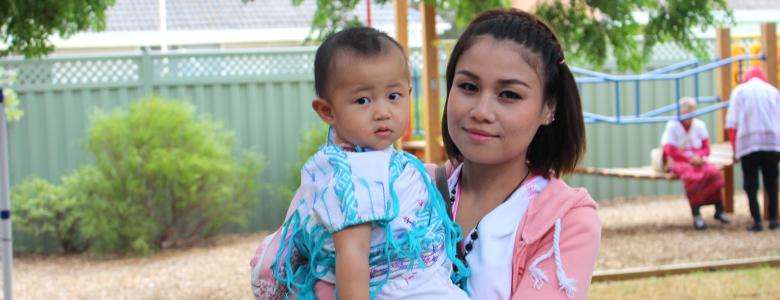A new model of community-based group pregnancy care for refugee women

A new model of community-based group pregnancy care and information, the 'Healthy Happy Beginnings' program, has been developed for Karen women from Burma to help them feel empowered and more confident during pregnancy, childbirth and the months after.
This Australian-first program was designed by health services in consultation with Karen families in Melbourne's western suburbs. The pilot program is free for women to attend and is designed to promote an understanding of the health system in the context of pregnancy and early childhood. Women are offered individual appointments for antenatal care with a midwife and an interpreter, alongside group information sessions with the nurse, midwife and bicultural worker.
Current evidence shows that refugee women experience a higher incidence of childbirth complications and poor birth outcomes. Resettled refugee women often face multiple barriers accessing pregnancy care and navigating health systems in high income countries.
An evaluation conducted by Murdoch Childrens Research Institute (MCRI) researchers found that women reported gaining new knowledge through learning about pregnancy and childbirth in the group setting and greater confidence in using health care.
Women who participated in the evaluation also reported challenges in the hospital during labour and birth, including a lack of professional interpreters and privacy.
Lead MCRI researcher Dr Elisha Riggs said that sharing experiences and stories in the group setting allows women to feel prepared, confident and reassured.
"Whilst the program ensures that women receive their antenatal care with a professional interpreter, one of the greatest benefits reported by women comes from storytelling with their peers, and developing trusting relationships with a team of professionals," Dr Riggs said.
The co-facilitated, interpreted discussions allowed women to communicate in their own language and discuss their questions, worries and concerns.
The study published today in Birth, demonstrated that the role of the bicultural worker was pivotal in the multidisciplinary care team as she provided continuity throughout the antenatal and postnatal period, assisted women with settlement issues, and helped staff understand cultural differences related to pregnancy and child rearing.
"Group pregnancy care has the potential to increase access for women with a refugee background to pregnancy care and information. The program allows these women to feel a sense of belonging, encourages cultural safety and a healthy start to life for their children," Dr Riggs said.

















